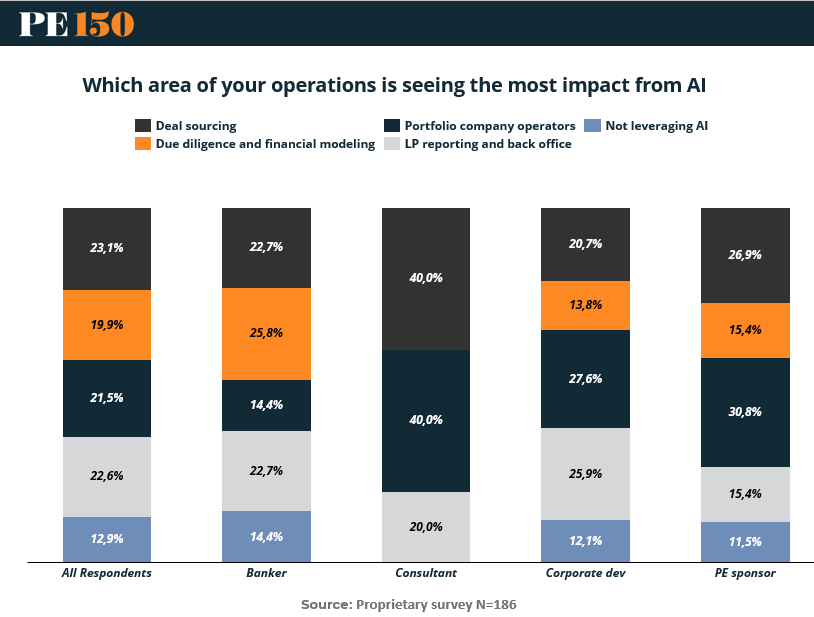- PE 150
- Posts
- Where AI Is Actually Reshaping Private Equity—And Where It’s Not
Where AI Is Actually Reshaping Private Equity—And Where It’s Not
Generative AI may be the headline, but in private equity, implementation is still very much below the fold. According to a proprietary PE150 survey of 186 professionals, AI’s impact is real—but concentrated. Rather than broad transformation, firms are deploying it where it can quietly reduce friction, automate labor, and scale repeatable tasks.
The results show a sharp divide by function and firm type.
Front-office functions are seeing the sharpest impact. Among consultants, AI adoption is aggressively focused on value creation. A full 80% cited either deal sourcing or portfolio company operations as the area most impacted by AI. Consultants, often responsible for BD pipelines and operational levers across a wide set of clients, are leaning into tools that can accelerate workflows—market maps, automation scripts, or generative dashboards—without heavy integration costs.

PE sponsors reflect a similar trend, though more distributed: 26.9% report AI’s biggest impact in deal sourcing, while 30.8% point to portfolio ops. That signals a shift from experimentation to embedded use. In sourcing, sponsors are increasingly augmenting traditional networks with AI-driven outbound, proprietary deal scoring, and scraped private company intelligence. On the portfolio side, AI is gaining ground in ops-heavy verticals—automating reporting, vendor monitoring, and operational KPIs.
Bankers, by contrast, are keeping it analytical. 25.8% say due diligence and financial modeling is where AI is most helpful. While bankers typically operate within strict compliance boundaries, many are using GenAI to reduce time spent on comparables, credit memos, and data room sorting. Deal sourcing saw less traction (22.7%)—a sign that AI hasn’t yet cracked the relationship-driven nature of the sell-side.
Corporate development teams are a mixed case. Their adoption of AI leans toward operational and back-office workflows: 27.6% say portfolio operations is the top area impacted, followed by 25.9% in LP reporting and back office. Unlike sponsors, corp dev teams are more embedded in enterprise compliance and often tasked with internal reporting and system integration—less glamorous, but more AI-ready.
What’s not moving? The back office. Across all respondents, just 22.6% pointed to LP reporting and admin functions as the most AI-impacted. For all the noise about AI disrupting fund admin or compliance, the tooling still lags—and procurement inertia is real. Notably, 12.9% of all respondents say they’re not using AI at all. The figure drops to 11.5% among PE sponsors, but that still suggests one in ten firms is sitting on the sidelines.
The strategic takeaway: AI in private equity isn’t a moonshot play—it’s a workflow fix. It’s winning where time is money, repetition is high, and compliance risk is manageable. Think portfolio dashboards, diligence memo drafts, BD automation—not strategic committee disruption.
For GPs, the imperative is pragmatic: skip the hype cycle and ask, What can we automate next week? Not How will this change the industry in ten years?